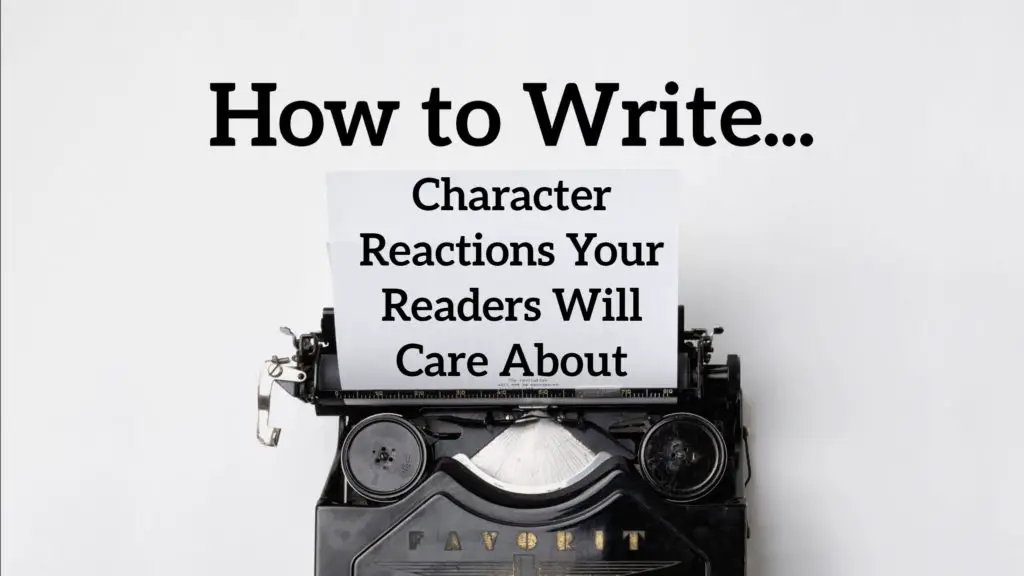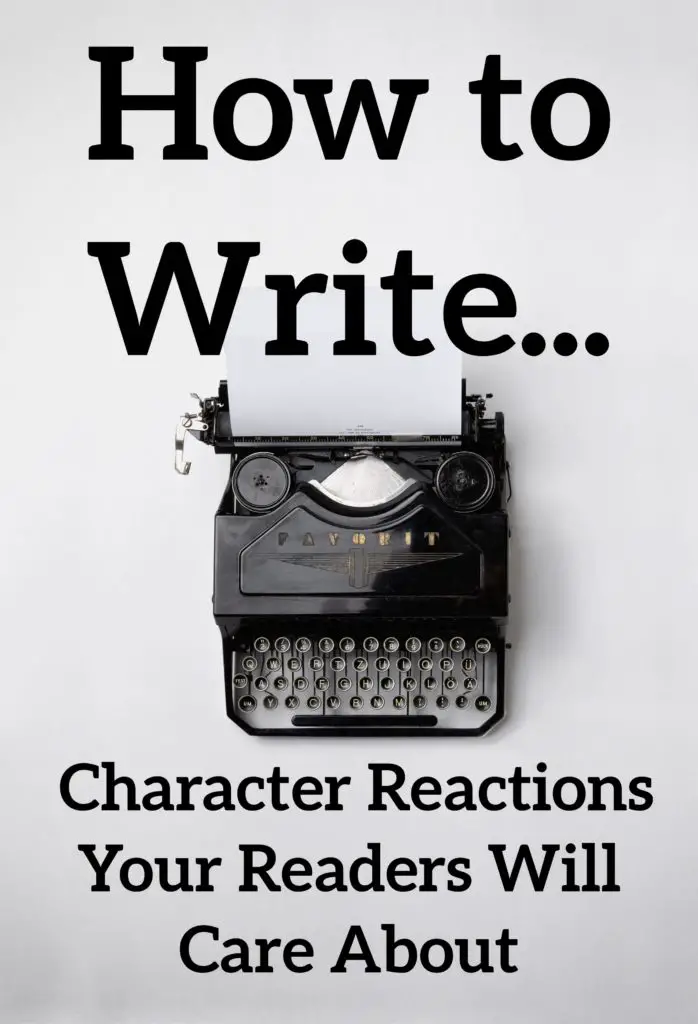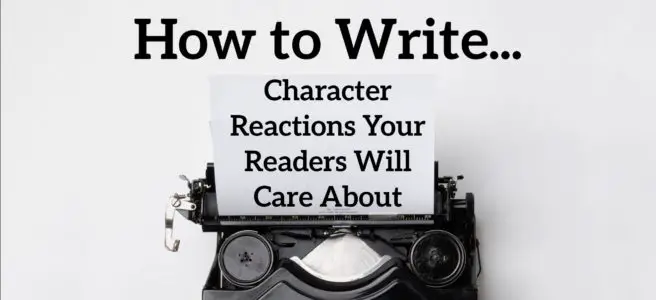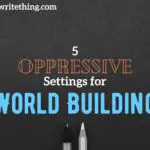
Writing Characters: How to Write Character Reactions Your Readers Will Care About
As readers, we don’t think about character reactions much, we just enjoy them, but as writers, one of the most important parts of writing characters and any scene is how our characters are reacting to people and events around them at any given moment.
We need to understand how to write characters when they are at home watching T.V. doing nothing and when they are escaping a brutal shoot out with explosions.
When writing characters, writing their reactions is extremely important.
How they react to one another, how they react to events, how they react to dialogue; how they react to what you put them through is the most interesting part of your character’s true self.
The way your protagonist reacts to others will decide whether or not your readers like your protagonist, much in the same way that we decide if we like people in real life based on how they react to certain situations we engage them in.
All that to say, as writers it is extremely important that we understand that how our characters react is extremely important and we need to be able to write their reactions well to carry our readers along with the story without hitting any bumps in the road.
A sure-fire way to become a better writer is to start a blog of your own in a niche you are passionate about: All You Need to Know To Start a Blog Here!
Try Grammarly, The Free tool that should be in every writer’s toolbelt.
Writing Characters: Your Characters Need to React to Events that Happen and React Appropriately.
When it comes to writing characters we need to understand our characters well personally and how they would react to what happens in a scene and react well.
Imagine sitting down with your protagonist to have coffee or a meal. Can you imagine how they would act in such a scenario?
Can you ask them questions in your mind and see how they would react and answer?
Can you interview your characters in your mind to find out how they would react to the events you want to put them through?
And what does it mean for them to react well?
It means that character needs to react the way only that character would and not the way a different character would.
For Example: Two girls are sitting on a train. Let’s call them Girl A and Girl B They just met. They are not more than acquaintances if not complete strangers.
A staff member from the train steps up to Girl A and says “mam, I’m so sorry we just received word that your parents have died in a horrible car accident.”
Girl A shrugs her shoulders and says “Ok.”
But Girl B the stranger, balls and screams and cries inconsolably for the duration of the ride.
You can see this would be a weird reaction.
We would expect Girl A to react the way Girl B did as it was Girl A’s parents that died a horrible death and Girl B doesn’t even know Girl A or her parents. Girl B might even try to kindly console Girl A, but we wouldn’t expect her to ball and scream about the scenario, but we might expect Girl A to do so, and if she doesn’t we will immediately question her in our minds.
This example shows that when we are writing characters we do have to think about how our character will react and how it must make sense and if it doesn’t that will make our readers curious.
This type of reactive thinking can be played out in several ways.
We either make the character react the way the audience expects them to and it helps the reader solidify how the character reacts and thinks and who they are as a person.
We can also use a character’s reaction to make the reader question why they reacted that way if the character reacts in a way that doesn’t fit.
Both are great tools to help your readers enjoy the story and carry the story along while revealing a character’s true nature.
Writing Characters: Your characters need to react to each other.

Normal people react to what others are doing all day long.
We say how are you doing to the grocery clerk.
We move over on the subway to let people through the doors.
We hold open doors at stores for others walking in behind us.
If someone curses at us in traffic, we react to it. We all react differently depending on who we are and what we believe.
In the same way, when writing characters your characters need to react to each other and they need to react appropriately.
Friends are sad for each other when something bad happens to one.
Enemies might not react or they might even be seen enjoying some bitter happening to the protagonist and the protagonist may even react to the enemy’s reaction.
It is very important that your important characters react to each other and react to the events happening in the plot depending on who they are around when the event happens.
If it happens when they are together the reader will see them react together.
If it happens separately we get to see who tells who what, how much and why. All things that are important to the plot and character relationship building and development.
Some characters might react one way around their friends, but completely different in public around strangers.
While you are writing characters the better you can write this in and make it unique to each important character you have the better your reader will be able to understand who each character is as an individual.
A sure-fire way to become a better writer is to start a blog of your own in a niche you are passionate about: All You Need to Know To Start a Blog Here!
Try Grammarly, The Free tool that should be in every writer’s toolbelt.
Writing Characters: How Our Character Reacts Says Much About What They Believe.
When a person reacts to an event or another person it can say many things about what they believe.
When a person gets stuck behind a slow car on the road, if they get mad and scream and curse, they might be the type of person that believes that they own the road and that no one should get in their way and that the slow car is actually hurting or abusing them in some way unbeknownst to them.
If on the other hand the character ignores it and keeps smiling and whistling while driving, they may be more of an optimist that believes that they have to find the silver lining in everything.
We must do this as writers writing characters well. We must find events and dialogue to show what our characters believe about themselves and the world around them.
As we are writing characters the more our readers are able to see more deeply who our characters are they will grow to love and hate them and when they feel so deeply about our characters that’s when they are really hooked and curious as to what will happen to these characters that they’ve come to know so deeply and so well.
People, in general, are more interested in people they feel deeply about, even if they loathe them. The type of person we don’t think much about is the character we feel indifferent towards. We aren’t very curious about what happens to them.
Use this truth to your advantage and reveal to your audience who your characters are in a deep way through writing characters’ reactions.
What events have you put your characters through and how have you had them react?
Do you know who your character is and how they would react to any given situation, or do you create your character’s personality on the fly as you go?
I hope this helps! Now Get Out There and Write Something!
Other Posts You May Love:
6 Easy Practical Steps to Becoming a Better Writer in 30 Days or Less
Why Start a Blog?
11 Easy Simple Steps to Start a Blog in 2019 (And Be Primed to Monetize With Owning Your Own Site)
A sure-fire way to become a better writer is to start a blog of your own in a niche you are passionate about: All You Need to Know To Start a Blog Here!
Try Grammarly, The Free tool that should be in every writer’s toolbelt.





I was unknowingly looking for this, thank you, it helped me a lot.
Can you please explain more about character reactions and works to create good characters
Thank you for the comment. I’m glad to know that this post helped you :))
Yes, I will be looking into adding more content like this in the future. Happy writing! 🙂